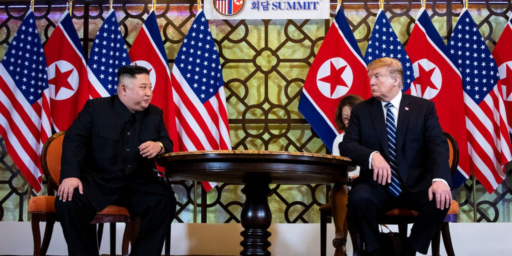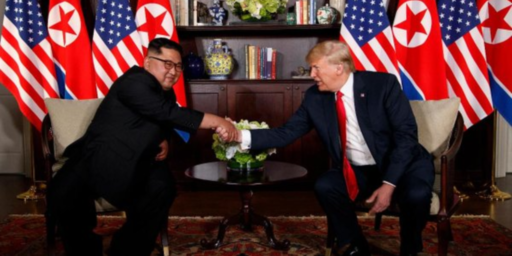North Korea Officially Joins Nuclear Club
North Korea has tested a nuclear weapon, becoming the eighth open member of the nuclear club. While merely confirming what was already considered a given, this still has enormous consequences, as David Sanger explains:
North Korea’s decision to conduct the test demonstrated what the world has suspected for years: the country has joined India, Pakistan and Israel as one of the world’s “undeclared” nuclear powers. India and Pakistan conducted tests in 1998; Israel has never acknowledged conducting a test or possessing a weapon. But by actually setting off a weapon, if that is proven, the North has chosen to end years of carefully crafted and diplomatically useful ambiguity about its abilities.
The North’s decision to set off a nuclear device could profoundly change the politics of Asia.
The test occurred only a week after Japan installed a new, more nationalistic prime minister, Shinzo Abe, and just as the country was renewing a debate about whether its ban on possessing nuclear weapons — deeply felt in a country that saw two of its cities incinerated in 1945 — still makes strategic sense.
And it shook the peninsula just as Mr. Abe was arriving in South Korea for the first time as prime minister, in an effort to repair a badly strained relationship, having just visited with Chinese leaders in Beijing. It places his untested administration in the midst of one of the region’s biggest security crises in years, and one whose outcome will be watched closely in Iran and other states suspected of attempting to follow the path that North Korea has taken.
WaPo’s analysts agree:
The test alters the balance of power in northeast Asia and touches off grave new concerns about the proliferation of refined nuclear material or devices to other rogue states or terrorist groups. North Korea, a secretive communist state which strictly limits all contact with the outside world, already generates tens of millions of dollars a year through its thriving underground sales of missiles and other sophisticated weaponry to nations including Iran and Syria.
It was also set to bring Pyongyang’s four-year standoff with Washington over its nuclear programs to a head. U.S. intelligence sources said the Bush administration is talking about immediate naval action around North Korea. “This won’t exactly be a blockade, which is an act of war. But we could stop and inspect all ships in and out of North Korea,” one senior U.S. government official said.
The war of words in the region is also heating up:
In a news conference in Seoul, visiting Japanese Prime Minister Shinzo Abe said the possession of nuclear weapons by North Korea “greatly threatens the northeast Asian region” and the rest of the world. Combined with North Korea’s development of longer-range ballistic missiles, he said, the testing of a nuclear weapon constitutes a “major threat” that extends “beyond northeast Asia.”
“We are now in a new era of nuclear threat,” Abe said after meeting with South Korean President Roh Moo Hyun. “This North Korean nuclear test is a great challenge to us, and the international community must take a firm stand on this challenge.” He said discussions are underway on “strict actions” in response, but he declined to elaborate.
Austin Bay points to a London Times article indicating that tensions were high between the DPRK and its one regional ally, China, even before the test was conducted.
As international tensions over North Korea have soared, China has deployed extra combat units of the People’s Liberation Army (PLA) to man the border from the Yalu River in the south to the Tumen River near Russia – evidently fearing the risk of chaos and collapse.
[…]
China’s dilemma is that its ruling elites are still bound to those of North Korea by a like-minded political authoritarianism. President Hu Jintao has even praised North Korea for keeping to its Stalinist politics, a view he may be repenting now that Kim has brought China to the brink of a nuclear crisis.
Beijing’s main fear is that if Kim tests a bomb – the CIA believes he has enough plutonium for four; other US experts think more – then Japan will feel it has no choice but to acquire its own atomic arsenal. That would destroy the balance of power in northeast Asia that has kept the peace since the end of the second world war.
China’s secondary fear is that if Kim’s regime collapses, hundreds of thousands of desperate, hungry North Koreans, some armed, will flood across its border to sow unrest and instability.
Josh Marshall dubs it “a strategic disaster of the first order” and, obviously, this is big news. OpFor’s John exclaims, “we’re talking about a nuclear weapon. A nation killer. A world killer. And it’s in the hands of a man whose sanity is suspect and is worshipped as a god by an army of over one million” and laments, “Korea is simply too small of a theater to be playing with nuclear toys. You can bet your britches that the far east paradigm just shifted, big time.”
Still, given that the DPRK is a nuclear regime led by a madman with a messiah complex, one suspects that the diplomatic wrangling will ends with something very much like the status quo. As Steven Taylor points out, “The North Korean economy is already a wreck and there isn’t going to be an invasion.”
John Little fears that “if we fail to act decisively” it will be perceived as “American weakness.” There’s something to that. President Bush proclaimed in his Axis of Evil speech that “the world’s most dangerous regimes must not be allowed to arm with the world’s most dangerous weapons.” It appears that two of the three are going to do just that. Ironically, we invaded and toppled the regime of the Axis member furthest from doing so.
Bryan Preston believes we need to act fast, before Team Kim figures out how to actually weaponize their nukes onto working ICBMs.
Still, our options are incredibly poor in the cases of the DPRK and Iran.
Ian Welsh blames Bush, forgetting that the programs in both North Korea and Iran have been ongoing for decades. He thinks there is a diplomatic solution that “requires acknowledging that those countries have reasons for having nukes, and finding ways to convince them their self interest includes not having them.” While this, definitionally, is true, it’s far from clear what the carrot might be. Welsh’s solution: “A smart president would throw up his hands, find out the price for stopping the program, round up the money from allies, and pay.” Of course, we did that in 1994 and still wound up with a nuclear DPRK.
Further, Matt Yglesias is right when he notes that the use of sanctions to push the Kim regime over the cliff that they’ve been heading for the past decade is not without peril. Right now, the nukes are mostly a lever that buys prestige and a high degree of security from invasion. Pushed to the point of desperation, however, it’s not inconceivable that Kim could decide that a Hail Mary pass is his best option.
UPDATE: Richard Gardner argues below that, since the DPRK went nuclear in violation of the non-proliferation treaty, we should not term them part of the nuclear “club,” which consists of legal possessors. That’s an interesting point.
This highlights what Cold War international relations scholars dubbed the “N+1 Dilemma.” At any given time, there are “N” nuclear possessing states. The international community treats that N as a ceiling and does whatever it can to prevent others from going nuclear. When failure occurs and a new state obtains the technology, much effort is made to persuade them to give up their weapons. Eventually, though, the realization is made that there’s not much that can be done and N+1 becomes the new N. The process then resumes.
The original members of the “club” had the weapons already and there was not much that could be done about it. The US had the weapons originally and ultimately shared the technology with its allies, the UK and France. The Soviets went nuclear on their own, creating panic, but it simply became an accepted fact once it happened. Ditto China. Some, like Israel, gained nukes and pretend they haven’t. Others, like Pakistan and North Korea, openly flout their illegal acquisition. Regardless, they get away with it.
UPDATE: Dale Franks expands on the last point:
The fundamental problem with non proliferation efforts is that, while it may be technically demanding, building a nuclear weapon is really just replicating a 60 year-old technology. It’s simply not something you can keep a lid on forever. And, as North Korea shows, even a dirt-poor state can muster the resources to build nuclear weapons.
UPDATE: Christopher Le Mon argues, persuasively, that North Korea did not violate international law with this test. The explanation is eyes-glaze-over boring but that’s the nature of international law. (Hat tip: Bobby Chesney)






No, not part of the nuclear club, rather a massive violation of the NPT. Really bad reporting. Like calling Khemer Rouge Communists (and is the pope catholic?).
Bush is now demanding decisive action by the UN. This is ironic, considering how hard Bolton and company have worked to tear down and weaken the UN.
I’m no fan of the UN, but I am a fan of a coherent, consistent, and comprehensive foreign policy.
I am a fan of a coherent, consistent, and comprehensive foreign policy
Wow, and I’m a fan of Miss. State football. Looks like we’re both having a bad year …
There is the case of N-1, namely South Africa. For what its worth, the precedent set there is that international sanctions and fostering internal dissent is what led to a regime change that got rid of its nukes. Now the $64 question is can this be replicated as successfully in the cases of NK and Iran?
Anon, tear down and weaken the UN?
I’m a fan of bulldozing the UN and putting up a proper Zoo so that all the rare species of Liberal contained there will have a better life in captivity with more natural surroundings, and I am looking to you my fellow typer’s to contribute some ideas to their future and more stabilized wellness.
DPRK withdrew from the NPT years ago, so they are not in violation of it.
I think people are getting strangely worked up over a largely symbolic event. NK has been widely believed to have nukes for several years now. That being the case, the test hasn’t really changed the current situation in any significant sense.
Thank goodness we are safe from Saddam and the WMD he had standing by to hit us with on 45 minute notice…
The “it’s a dud” theory has spread to the NYT.
The self-proclaimed Arms Control Wonk has an amusing post on that subject:
“No one has ever dudded their first test of a simple fission device. North Korean nuclear scientists are now officially the worst ever.”
Hello,
I’m compiling the largest roundup in the Blogosphere on the North Korean Nuclear test and I added your comments/link to the post: Link
Even if the test was dud, it doesn’t mean they wont pull themselves together like Pakistan did and be eventualy successful.